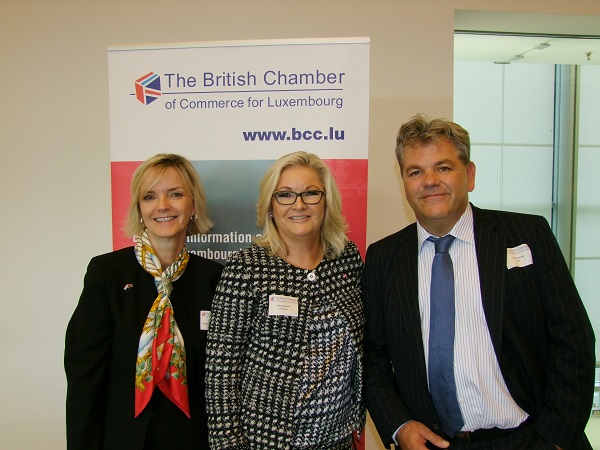
In his 21 years in Luxembourg, John Parkhouse has seen a huge growth in the asset management industry in the Grand Duchy; he explained that funds are designed to go cross-border, which ensures Luxembourg looks at issues globally.
With people working together for the good of Luxembourg, there is a real willingness of the asset managers, the regulator and government to work together.
With a background as a chartered accountant, John Parkhouse grew up with the funds industry and has worked in New York City before coming here. On 1 July this year he took over as CEO of PwC in Luxembourg; he acknowled that there is a huge amount of potential with their people and the opportunities. 57 nationalities are represented in the PwC Luxembourg talent pool, and they are in the process of taking on board partners from other countries which he explained as being reflective of the industry so they can serve global businesses with this diversity and energy.
There are two main challenges, to sell (promote) the firm and to sell (promote) the territory, where the country's Nation Branding initiative plays a key role. This includes both attracting talent from abroad as well as from locally - around 50 of the 2,500 staff are currently Luxembourgish.
The main driver at present is technology which is on the cusp, from an audit perspective, of transforming what they do and how they deliver the services and solutions they provide to clients. It is also disruptive as technology takes over lives; it is transformational and they want to stay ahead of the technology.
The global nature of such Big 4 firms also needs to get the balance right in terms of technology and investment. But what about the people? He explained that his thinking is not to predict how big they could get. Also, the actual scale on where they can go is not based on the size of Luxembourg, as their client base is global; this will remain so as long as Luxembourg remains competitive.
Regulation, including audit reform and tax changes, e.g. BEPS, are key to the future too. The firm is still very audit-dominated, but it needs to become more flexible and less reliant in this area. Tax work, including compliance, as well as transfer pricing, are becoming key areas; moving forward needs constructive regulatory oversight.
Asked about the issue of automatic indexation in Luxembourg, John Parkhouse explained that a balance is required to ensure that a good level of salaries is maintained, to attract top staff. On the other hand, there is less room to manoeuvre in terms of business needs, which makes it challenging. While understanding the social aspect he does admit having automatic indexation is challenging.
Financial Services
John Parkhouse explained that the message from the top, from Luxembourg's Minister of Finance, that the country loves banks, etc., is key as it sends out a consistent message. He believes that the funds industry will remain core to Luxembourg's economy, despite other jurisdictions trying to attract funds to their domicile. On the other hand, he feels Luxembourg will suffer as it is poorly positioned in terms of ETFs and passive investments. Luxembourg, though, has started well in alternative funds; overall Luxembourg will do well in the future.
With new banks coming to Luxembourg from China and Brazil, etc., the private banking and wealth management sub-sectors have come though and are seeing growth in assets. A number of Swiss players are now moving services from Geneva and Zurich to Luxembourg, representing the higher end of the wealth curve.
Another thing that we can see coming, he explained, is the whole substance agenda, e.g. BEPS, UCITS, etc., which is providing substance to these areas, meaning Luxembourg can be attractive to new talent in these domains too. The concentration in expertise around asset services is unique and the readiness to discuss and maintain dialogue is something not seen elsewhere.
Luxembourg
Ensuring Luxembourg remains at the forefront will be helped in part by the growth in FinTech. While the effect on VAT incomes due to eCommerce regulation changes has hit Luxembourg hard, the country will recover and grow.
To close, he stated that the Grand Duchy will (1) remain agile and innovative - small is beautiful, (2) retain and nurture the "Lux Inc" mentality, and (3) increas the Luxembourg profile to ensure that it grows, not only in terms of financial services.
John Parkhouse, the new CEO at PWC in Luxembourg, was speaking at the British Chamber of Commerce on Monday lunchtime at La Table du Belvedere in Luxembourg-Kirchberg, outlining the opportunities and challenges of heading a major professional firm in Luxembourg today, how he sees the future evolution of the profession, the outlook and challenges for the financial services sector and the wider Luxembourg economy.
Photo by Geoff Thompson (L-R): Sophie Kerschen, BCC; Alison Macleod, BCC Chairman; John Parkhouse, CEO at PwC Luxembourg








